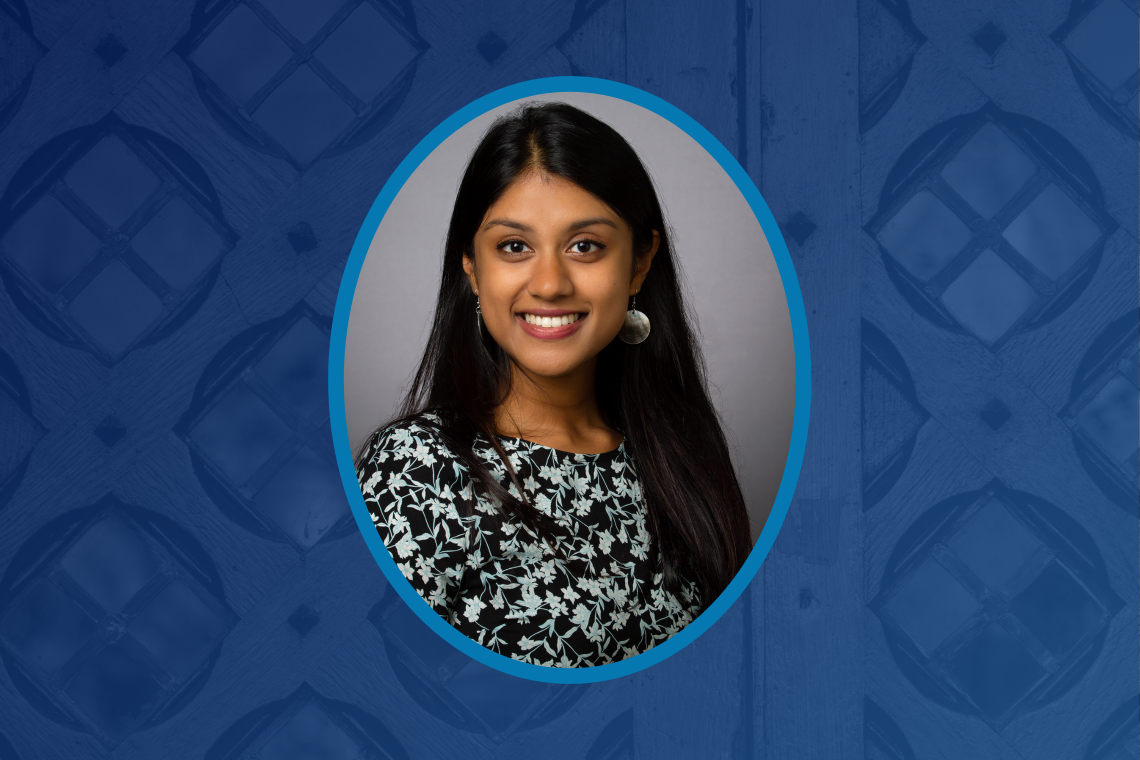Student Commencement Speaker on the Spaces that Shrank During the Pandemic

In a year that turned so many things upside-down, senior Meghana Sai Iragavarapu had a lot of time to think about what the pandemic did to her notions of space between people.
“The concept of space is compelling to me,” said the Greensboro native and Robertson Scholar. “In all my research projects and civic engagement, I’ve worked to lessen the space between the people I was working with and myself. I try to walk in their shoes and understand better their experiences.
“The contrast with COVID couldn’t be more stark. COVID made us widen that space or break connections entirely. I spent much of this quarantine period thinking about what was filling all that added space between us.”
Filling that empty space will be one of the themes of the talk Iragavarapu will deliver as the Class of 2021 student speaker at the May 2 undergraduate commencement ceremony. A university committee selected her speech out of a large number submitted by students to represent the student body.
Speaking at commencement wasn’t on her Duke bucket list at the beginning of the year, Iragavarapu said. But COVID changed that too. A self-described extrovert, Iragavarapu said she had been used to being around friends and sharing thoughts, feelings and experiences.
Unable to do that as often during the pandemic, Iragavarapu said she decided to reach out to others in larger and more unusual context.
“I wouldn’t have applied to speak had it not been for COVID,” she said. “I did not expect to be chosen, and I’m grateful and humbled that something I said in the speech resonated with the committee and hopefully my class.”
Iragavarapu said she recognizes the importance a student commencement speech holds for the Class of 2021. “Suffice to say, this is a big undertaking. My worry is that in a challenging year, I have a responsibility to attempt to honor everyone’s experience.”
Part of the talk will recall lessons from her Duke experiences, from projects that took her to Fiji and Buenos Aires to a Bass Connections project here in Durham that studied racial and class disparities in local health care.
That interest in building connections also led her to volunteer at the Lincoln Community Health Center in Durham, where she facilitated access to health care for low-income people looking to lose weight and reduce health risks such as diabetes.
Interacting with Lincoln patients taught her much about the historical misgivings that constitute a major barrier to access to health care among Black Americans and other marginalized groups. And it taught her how to shrink the space between the patients and herself by learning about their lives.
“I learned how to use my ears and mouth in the ratio they were given, 2:1. I learned how to be a good listener, to honor life stories to understand better why people may have certain health risks. Whenever I approached a project of improvement, I learned if people are resisting, it’s because they have motives to do so, and I needed to respect that.
“COVID stopped all this work, and it broke my heart. These patients live 10 minutes from me, but during the pandemic, there was no way I could visit with them. The participants are all high risk for COVID. In the end, I held my heart for a long time, but I had to let go of people and a project I was heavily invested in.”
She’s not alone in that kind of heartfelt COVID experience, and she said one message of her address will be to emphasize to all students the “character we now know we have because of this adversity.”
After commencement, Iragavarapu will move to Boston to work at the Vascular Anomalies Center at Harvard University’s primary pediatric program. She said she sees it as a growth year providing valuable experience before she applies to medical school.
She thanked her family, friends, mentors and many others for providing the Duke experience that prevails throughout her speech and is eager to see reactions from her classmates.
“When I talk to people, I work hard to respond to their facial expressions and nonverbal cues. Now, I imagine looking out at more than a thousand classmates all in their masks and wonder how I am going to know if they are responding? I’ll have to look at their eyes and hope I pick something up!”